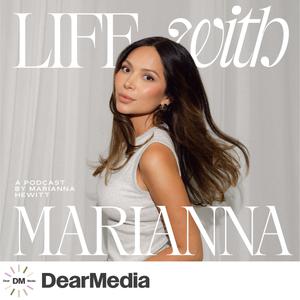
Crash Course Fashion
The Sustainable Fashion Forum
Welcome to Crash Course Fashion, the weekly podca…
- 54 minutes 38 secondsBalancing Sustainability with Profitability in Business Models and Operations.
At the 2024 Sustainable Fashion Forum, Bridget Bauman, Senior Consultant for Sustainability of Energy and Climate Change at WSP, sat down with Amelia Eleiter, co-founder and CEO of Debrand, Ann Cantrell, FIT, Kathryn Danielsen, eBay, and Sarah Haworth, Circular Commerce Strategist, to discuss addressing the challenges and capitalizing on the opportunities.
7 May 2024, 12:00 pm - 52 minutes 40 secondsThe Honest Journey of Scaling a Changemaker Brand with Adam Taubenfligel of Triarchy
In today's episode, we delve into Triarchy's journey as a sustainable denim brand, exploring its commitment to ethical practices and environmental integrity, the partnerships involved in scaling sustainably, and the challenges of what it takes to walk a different path.
25 April 2024, 8:09 pm - 42 minutes 39 secondsCracking the Code: Why Resale Succeeds for Some and Eludes Others with Trove's Andy Ruben
The resale industry is witnessing significant growth.
According to thredUP's annual resale report, the global secondhand market is projected to nearly double and reach a value of $350 billion by 2027, outpacing the global apparel industry by threefold. As consumers increasingly seek more responsible ways to engage with fashion, resale platforms and secondhand marketplaces have gained momentum, prompting fashion brands and retailers to launch their own resale initiatives to attract new customers, enhance their brand image, create an additional revenue stream, and boost their sustainability credentials all while catering to evolving consumer preferences and demands.
As a result, various resale options have emerged, from resale-specific websites to plug-and-play solutions like Trove, enabling brands and retailers to seamlessly integrate resale into their operations. However, the soaring success of the secondhand market does not guarantee automatic success for brands and retailers that simply adopt a resale model. While some have seamlessly integrated resale into their business models and thrived, others have struggled to find the right formula for success.
In today’s episode of the Crash Course Fashion podcast, host Brittany Sierra chats with Trove’s Founder and Executive Chairman, Andy Ruben. Together, they delve into key strategies for success in the secondhand market, exploring how companies can make resale a profitable part of their business model while navigating the industry's nascency.
Additional Resources:
Check out Trove
Read Trove’s Brand Resale Index
Read thredUP’s 2023 Annual Resale Report
Make your next career move with the SFF Job Board
Follow SFF on Instagram @thesustainablefashionforum
Connect with Brittany on LinkedIn
2 August 2023, 12:00 pm - 32 minutes 47 secondsCircularity 23 Debrief: Waste as Resource, GenZ Leadership, Perception-Driven Demand, and the Pursuit of Sustainable Growth Over Sacrifice
In this solo episode, host Brittany Sierra reflects on her learnings from the Circularity 23 conference, including the idea of waste as a valuable resource and the importance of integrating the material story into products via tech to turn anonymous waste into an asset with a known value and a clear pathway for reuse and recycling. Brittany discusses the necessity of intergenerational thought diversity and the value in recognizing that each generation brings its unique set of values, knowledge, and cultural context to the table, which can significantly enrich decision-making processes, problem-solving, and innovation. Brittany discusses the power of perception-driven demand and the rise of consumerism in the 20th century. Finally, she shares a powerful message from the Descendants Project about the pursuit of sustainable growth over sacrifice.
Connect with Brittany @BrittanySiierra
Watch The Descendants Project founders speak at Circularity 23
15 June 2023, 1:46 pm - 55 minutes 55 secondsBalancing Profitability and Responsibility: Navigating the Complexities of Sustainable Fashion
This week on the Crash Course Fashion podcast, SFF founder and CCF host Brittany Sierra speaks with Raz Godelnik, Assistant Professor of Strategic Design & Management at Parsons School of Design - The New School, Jan Lo, CEO of Lo & Sons, Kohl Crecelius, Co-Founder of Known Supply, and Nina Ahuja, Head of Business Development at Trove — to explore sustainable fashions path to profitability, shedding light on the delicate balance between growth and sustainability, profit and purpose, in a world of economic uncertainty and changing consumer behavior.
Follow the Sustainable Fashion Forum: @thesustainablefashionforum
Connect with Raz for a FREE digital copy of his book, Rethinking Corporate Sustainability in the Era of Climate Crisis: A Strategic Design Approach.
1 June 2023, 12:00 pm - 1 hour 6 minutesHow the Digital Wardrobe App, Indyx is Disrupting the Future of Consumption and Resale
In this episode of the Crash Course Fashion podcast, host Brittany Sierra sits down with Yidi Campbell, founder of the innovative tech startup, Indyx. With a background in investment banking and retail strategy, Yidi is using her intimate, behind-the-scenes knowledge of the retail industry to reshape our relationship with our wardrobes. As an avid reseller who has observed the pain points of the resale industry firsthand and understood the disconnect between the contents of consumer closets and the sustainability goals of fashion brands, Yidi conceived Indyx. This unique digital wardrobe app unifies cataloging, styling, and reselling under one virtual roof, addressing issues from multiple angles in the fashion industry.
Indyx aims to challenge rampant overconsumption in the fashion industry by fostering a more sustainable relationship with clothing. By unlocking the hidden potential of existing wardrobes and helping users understand their unique style, Indyx promotes mindful consumption. It's not just about buying less; it's about making the most of what we already own. Moreover, Indyx seeks to breathe new life into the 'grey inventory' hanging in our closets, creating a continuous stream of quality inventory for the resale industry from our own wardrobes, thereby reducing reliance on brands' overproduction.
In this candid conversation, Yidi discusses the business realities brands face on their sustainability journey. Drawing on her experience with brands like Gap Inc. and Athleta, she explores the challenges posed by thin profit margins and the difficulty for brands to commit to sustainable practices. Yidi shares insights into the operational metrics and strategic approaches that Indyx uses to align business growth with sustainability goals.
True to the spirit of our show, this episode delivers an in-depth look into Indyx's business model that merges sustainability with technological innovation in the fashion industry and how Indyx can join the flexible gig economy offering jobs to women around the globe. Yidi's first-hand experience and unique insights not only shed light on the future of sustainable fashion, where technology and business acumen lead the way but also offer practical advice for those looking to make a tangible difference.
Join us as we explore how Indyx is shifting the fashion landscape towards sustainability and tune in to Yidi's insightful perspectives on why consumers, not brands, must be at the forefront of leading change.
Follow Brittany
Follow Yidi
Check out Indyx
24 May 2023, 2:19 pm - 52 minutes 39 secondsA Business Case for Sustainability: Lessons from HanesBrands Chief Sustainability Officer, Chris Fox
In today's fast-paced world, sustainability is not just a buzzword, but a business imperative. More than ever, companies are being tasked with balancing profitability with responsibility while also considering the environmental, social, and economic impacts of their decisions. But as many of us have seen, it's all too easy for sustainability initiatives to become siloed and disjointed from a company's overall strategy. So, how can brands effectively integrate sustainability into their business operations in a way that's good for the planet, drives growth, and satisfies consumer demand?
In this episode of the Crash Course Fashion Podcast, we're joined by Chris Fox, Chief Sustainability Officer at HanesBrands, who shares insights from his 25-year career on integrating sustainability into the core of business operations. We delve into how HanesBrands aligns environmental responsibility with profitability, exploring the challenges and complexities of implementing global sustainability initiatives. Chris offers an inside look into how HanesBrands meets evolving consumer expectations while prioritizing transparency, authenticity, and data-driven strategies to avoid the pitfalls of greenwashing. We also discuss the company's future sustainability goals, including technical innovations and its evolving role in shaping the industry's sustainability landscape. This episode is a deep dive into the realities of corporate sustainability, offering practical examples and valuable lessons on flexibility, learning, and adaptation for long-term success.16 May 2023, 12:00 pm - 1 hour 7 minutesIntegrating Bio-Based Materials into Existing Supply Chains
In this week’s episode of Crash Course Fashion, DuPont Biomaterials Global Business Director Mike Saltzberg; Material Innovation Initiative’s Thomasine Dolan; and Prime Movers Lab’s Gaetano Crupi discuss the challenges and opportunities of integrating bio-based materials into existing supply chains led by Glossy reporter, Zofia Zwieglinska. This discussion first aired during the 2022 Sustainable Fashion Forum and was powered by DuPont Biomaterials.
23 May 2022, 3:42 pm - 1 hour 3 minutesWhat *Really* Makes a Sustainable Material? Industry Insiders Weigh In
A large portion of a garment's environmental footprint is determined at the raw material level, so for many designers and brands, the easiest first step on their sustainability journey is to begin by replacing existing materials with sustainable alternatives. However, sustainable material sourcing is no easy task.
Whether plant-based, animal-based or synthetic manmade fiber, every material choice comes with trade-offs. The extraction, processing, and manufacturing of materials is inherently accompanied by challenges that can have short-term and long-term implications on people and the planet.
Whether a fiber is better or worse depends on the numerous factors influencing the life cycle of fabric – from the cultivation of the crop through to processing, assembly, transportation, use, and the subsequent disposal of the garment by the consumer. Adding another layer of complexity, just like "sustainability" can mean many different things depending on personal ethos, the same can be said for determining sustainable materials. A sustainable material could refer to it containing no animal byproducts, or it can mean no plastic (not even recycled). It could be defined as less water use, fewer carbon emissions, or fewer chemicals.
How should brands approach material sustainability with so many contradicting and differing perspectives? What makes a sustainable material? What questions should brands ask when determining what materials to use? How should data be used to compare and contrast materials? What is the role of third-party ranking systems and certifications?
During the 2022 Sustainable Fashion Forum, Dr. Amanda Parkes, Chief Innovation Officer at PANGAIA, Diana Rosenberg, Sr. Manager, Product Sustainability at GAP Inc, Adam Taubenfligel, Creative Director at Triarchy Denim, and Tara St James, Founder of Re:Source(d) and Vice President of Supply Chain and Sustainability at Another Tomorrow, hit the SFF digital mainstage for an industry roundtable moderated by Jasmin Malik Chua, Sourcing Journal's Sourcing and Labor Editor, exploring the nuances layers of material sustainability.
19 May 2022, 12:58 pm - 39 minutes 8 secondsUnpacking the 'Fashion Act' with New York State Senator Alessandra Biaggi
In January, the Fashion Sustainability and Social Accountability Act (or the Fashion Act) was unveiled: a bill many are calling a "groundbreaking" and "historic" step towards bringing accountability to the fashion industry and holding the biggest brands accountable for their environmental and social impacts.
If signed into law, the Fashion Act would require all major apparel and footwear companies that generate $100 million in global revenue and do business in the state of New York to map their supply chain, engage in mandatory due diligence, identify and address risks, and set and meet science-based targets.
What does the Fashion Act mean for the fashion industry? Is disclosure enough to truly hold the industry accountable? Now that the bill has been introduced, what happens now? New York State Senator Alessandra Biaggi joined SFF founder Brittany Sierra during the 2022 Sustainable Fashion Forum to discuss. Hear their convo here.
Signup for Earthday.Org's webinar: Fitting Fashion For the Future: How New York State's Historic Fashion Act Hopes to Change the Fashion Industry for Good.
11 May 2022, 10:12 pm - 51 minutes 37 secondsEllen MacArthur Foundation’s Laura Balmond: ‘Circularity Isn’t a Product, It’s a System’
Motivated by the threat of limited resources and a growing concern among consumers about the environmental impact of their purchases, the fashion industry is embracing the idea of circular fashion. However, without an industry-wide, agreed-upon definition, the concept of a circular fashion system has become distorted as more and more brands apply the term in their marketing.
In this episode of Crash Course Fashion, hear SFF founder Brittany Sierra in conversation with Laura Balmond, Ellen MacArthur Foundation's Fashion Initiative Lead, to discuss what makes a circular product, the government’s role in accelerating the industry’s transition to a circular economy, what's needed to enable circular systems across markets, and more!
Grab tickets to our annual conference
8 March 2022, 5:23 pm - More Episodes? Get the App
Your feedback is valuable to us. Should you encounter any bugs, glitches, lack of functionality or other problems, please email us on [email protected] or join Moon.FM Telegram Group where you can talk directly to the dev team who are happy to answer any queries.
 Second Life
Second Life
 Life with Marianna
Life with Marianna